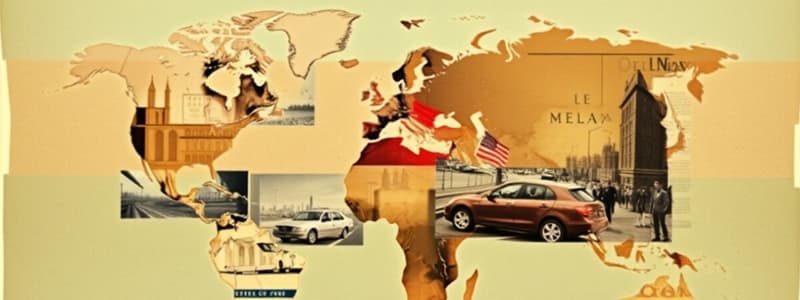Podcast
Questions and Answers
What characterizes the condition of globality?
What characterizes the condition of globality?
- Tight global interconnections and flows (correct)
- Loose connections between nations
- A clear beginning and endpoint
- Focus solely on economic aspects
Which statement best describes the process of globalization?
Which statement best describes the process of globalization?
- It solely increases international trade.
- It isolates communities from global influences.
- It enhances individual national identities.
- It transforms nationality into a unified global identity. (correct)
Which is NOT one of the main forms of globalization?
Which is NOT one of the main forms of globalization?
- Embodied People
- Disembodied Ideas
- Institutional Organizations
- Fragmented Communities (correct)
What impact does globalization have on community awareness?
What impact does globalization have on community awareness?
Which dimension does globalization NOT typically encompass?
Which dimension does globalization NOT typically encompass?
What distinguishes embodied globalization from disembodied globalization?
What distinguishes embodied globalization from disembodied globalization?
Which period marked the beginning of long-distance trade connecting the West and East?
Which period marked the beginning of long-distance trade connecting the West and East?
Which of the following is a consequence of globalization during the modern period?
Which of the following is a consequence of globalization during the modern period?
What technological achievement is associated with the early modern period of globalization?
What technological achievement is associated with the early modern period of globalization?
Which term best describes the global circulation of commodities and trade goods?
Which term best describes the global circulation of commodities and trade goods?
Flashcards are hidden until you start studying
Study Notes
Concepts of Globalization
- Globalization is a complex social process that interconnects the world by economic, political, cultural, and environmental means.
- Globalization transforms traditional national identities into a single global identity.
- The idea of a singular global whole, where local and global elements interact, is a key aspect of globalization.
- Globalization is characterized by the creation and growth of networks, the expansion of relationships, the intensifying and speeding up of interactions, and the shaping of new community awareness and identities.
Dimensions of Globalization
- Globalization encompasses economic, political, and cultural dimensions.
- Four major forms of globalization exist:
- Embodied People: This includes tourists, refugees, business people, and travelers.
- Disembodied Ideas: This includes data, information, and images.
- Objectified Things: This includes tradable commodities, greenhouse gases, and viruses.
- Institutional Organizations: This includes empires, states, military, corporations, churches, clubs, and other organizations.
Types of Globalization
- Embodied globalization refers to the interconnectedness and movement of people globally. Examples include refugees and tourists.
- Disembodied globalization focuses on the flow of data, ideas, and information. Examples include digital communications and cryptocurrencies.
- Objectified globalization refers to the global circulation of commodities and objects. Examples include trade goods and viral particles.
- International globalization describes the global reach of institutions and organizations. Examples include states, corporations, and NGOs.
Historical Overview of Globalization
- Prehistorical Period (10,000 BCE - 3500 BCE): Marked by limited geographical reach and human migration.
- Premodern Period (3500 BCE - 1500 BCE): Characterized by early stages of globalization, including advancements in technology (writing and the wheel), the rise of empires (Roman, Chinese, Persian), and long-distance trade routes like the Silk Road connecting the East and West.
- Early Modern Period (1500 - 1750): Significant increase in trade and migration, driven by events like Christopher Columbus' discovery of the New World, Ferdinand Magellan's circumnavigation of the globe, and the spread of cultural and world religions. This period also saw the transmission of infectious diseases like the bubonic plague and technological and social innovations such as mechanized printing, navigation, and the postal system.
- Modern Period (1750 - 1945): Marked by expanding influence, colonization, industrialization, mass communications, social change, and the increasing significance of language. This period also saw the emergence of a global economy facilitated by the gold standard and world banking.
- Post-War Developments (1945 - 1990): Characterized by a global system of cooperation and interdependence with the establishment of international organizations like the United Nations and the rise of the global South.
- Modern Contemporary Period (1990 - present): Marked by accelerated globalization, rapid global impact, and a focus on convergence, collapse, and the spread of connections.
Consequences of Globalization
- Reformation: The emergence of new Protestant denominations challenging the authority of the Catholic Church.
- Rise of Capitalism: The development of a global capitalist system, with increasing focus on trade and market forces.
- Religious Conflicts: The spread of world religions led to conflicts and tensions between different belief systems.
- Expansion of Influence: Western powers expanded their influence across the globe, leading to colonialism and imperial dominance.
- Industrialization: The rise of factories and mass production, revolutionizing global economies and transforming social structures.
- Mass Communications: Emergence of new technologies for communication, spreading information and ideas rapidly across the globe.
- Social Change: Global interconnectedness brought about social transformations, including urbanization, migration, and the rise of new social movements.
Studying That Suits You
Use AI to generate personalized quizzes and flashcards to suit your learning preferences.




